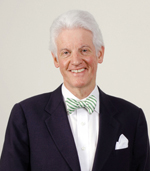Reaching Out to Curb Terrorism

William H. Neukom. Photo by Paul Berg.
Six years ago, jetliners exploding into the World Trade Center and Pentagon shocked us out of a false sense of security, just as bomber pilots bearing down on unsuspecting ships at Pearl Harbor did 60 years before.
We learned that neither military might nor vast oceans are sufficient to protect us in an ever-shrinking, interconnected world. Conditions abroad and in the United States are interrelated. Increasingly, the safety of families in Lebanon, Mo., and in the nation of Lebanon is linked.
Terrorism takes many forms, but communities that fail to satisfy people’s basic needs—communities that suffer from extreme violence, poverty, corruption, sickness and ignorance—are fertile breeding grounds for terrorism. We must address these problems to protect ourselves and to advance justice.
With the resources and knowledge we have, why can’t we do more to address conditions that give rise to terrorism? The answer involves the rule of law—or, more precisely, its absence.
The rule of law gives traction to efforts to address the world’s most deep-rooted problems. It is the foundation for societies of opportunity and equity. Without the rule of law, communities are vulnerable to grave problems, including terrorism.
We are organizing a multidisciplinary movement to advance the rule of law—in the United States and internationally—through the World Justice Project.
The project complements efforts that the ABA began in 1990 to provide technical legal assistance to nations after the collapse of the Soviet Union, and that continue today in approximately 40 nations through the Rule of Law Initiative.
Providing technical legal assistance abroad is critical, but advancing the rule of law also requires participation by other disciplines, such as journalism, human rights advocacy and medicine. These disciplines have learned the rule of law is needed to accomplish specific goals, and have seen their efforts undermined by its absence.
Journalists strive to hold government accountable by keeping citizens informed, but unscrupulous officials often hamper their efforts. Human rights advocates expose government and corporate abuses but frequently lack the means to exact penalties and prevent future violations. Doctors try to distribute medicine in poor nations but cannot get it to those most in need because of corruption in the form of graft and black markets.
WORK BEGINS AT HOME
Advancing the rule of law in the U.S. is essential to improving our communities and enhancing our nation’s credibility as a leader on rule of law issues. Two familiar but important examples of how to strengthen the rule of law in the U.S. are increasing poor people’s access to legal assistance and protecting judicial independence. We also must be sure that U.S. responses to terrorism do not inadvertently undermine the rule of law by eroding human rights in our country and abroad.
The World Justice Project is uniting the many professions and disciplines whose work depends on advancing the rule of law. Through education and discussion at multidisciplinary conferences in the U.S., Africa, Asia, Europe and Latin America, the project is making the rule of law a mainstream concept—as central to businesspeople, engineers and environmentalists as it is to lawyers.
The project is developing new tools to strengthen the rule of law. A team of scholars, including Nobel laureates Amartya Sen and James Heckman, will examine how the rule of law impacts efforts to address the world’s gravest problems. The project also is developing a rule of law index to assess how the United States and other countries are adhering to the rule of law.
In July 2008 the project will sponsor the World Justice Forum in Vienna, Austria. This international, multidisciplinary “town square” will enable top theorists and practitioners to share information, build new networks, create new tools and incubate new programs.
The World Justice Project’s multidisciplinary and multinational approach will lead to steady progress that has not been possible through scattered efforts. Together, we can address problems that affect us all—and make the world safer from terrorism in the process.
Write a letter to the editor, share a story tip or update, or report an error.


